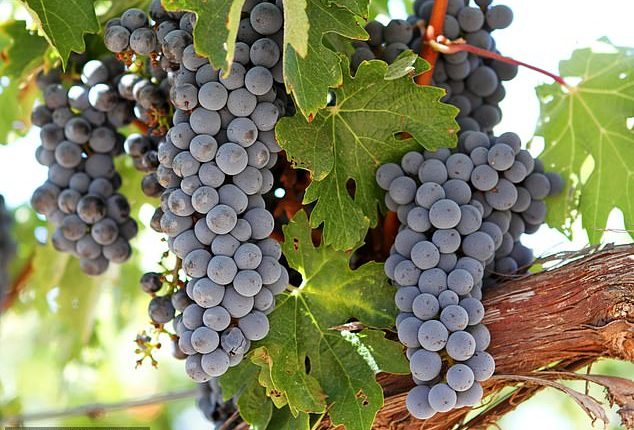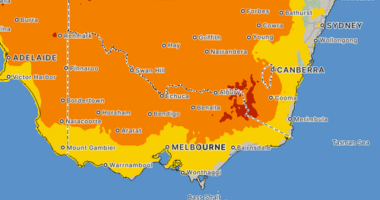Share this @internewscast.com
When it comes to delicious wines, countries like South Africa, France, and New Zealand might spring to mind.
But there’s good news for people living here in the UK, as more homegrown wine could be on its way – thanks to climate change.
According to a new report, higher temperatures will provide perfect conditions for Cabernet Sauvignon further north.
By the year 2100, regions in the UK like Yorkshire’s Hull, along with the Midlands, East Anglia, south Wales, and southern England, could become ideal for growing Cabernet Sauvignon, extending its presence across a broader part of northern Europe as well.
Scientists think that as the climate warms, more of the UK will offer ideal growing conditions for the grape, which thrives in hot, sunny climates.
However, Scotland will still be too cold for Cabernet Sauv even by 2100, while much of Mediterranean Europe will be too hot.
The first edition of the Fine Wines and Restaurants Market Monitor report, produced by the consultancy Bain & Company, highlights that climate change is reshaping global wine production areas.
‘Cabernet Sauvignon will be viable at more northern latitudes by the end of the century,’ it says.

Cabernet Sauvignon ranks among the most favored grape varieties within the wine industry, yet traditionally, the UK’s climate has been too cold for it to flourish (file photo).
Although it’s one of the one of the world’s most widely recognized red wine grape varieties, Cabernet Sauvignon isn’t commonly grown in Britain.
In fact, currently Cabernet Sauvignon is only grown in southeastern England – already recognised as one of the UK’s best grape-growing regions generally.
By 2100, Cabernet Sauvignon could potentially be grown as far north as Hull – although Scotland will remain too cold for the grape.
According to the report, it’s not just England and Wales that will benefit, but also Germany, Belgium, the Netherlands, Poland, Denmark, Sweden, Lithuania and Latvia among those
In 2025, there are regions of Europe which successfully grow Cabernet Sauvignon grapes in 2025 – such as northern Spain and southern France.
But these regions will become simply too hot by 2100, meaning Cabernet Sauvignon yields from these countries will likely fall compared with now.
‘If the climate challenge is not addressed Cabernet Sauvignon, once exclusive to southern Europe, may thrive in central and northern regions by 2100,’ the report says.
‘To adapt, the industry must invest in policy reforms, agricultural technology, and collaborative solutions to ensure a sustainable future.’

These maps show the European regions suitable for growing Cabernet Sauvignon grapes at present (left) and in 2100 (right). Note the loss of suitable regions in Spain, France and Italy, while more of the UK and other countries including Germany, Belgium and Poland will gain suitable growth conditions for the grape

Global warming will deal a devastating blow to vineyards in California, the south of France, northern Spain and Italy, a prior analysis found
Already, the UK’s wine industry is seeing the benefits of warmer conditions – one of the very few perks of climate change.
In the last few years, the most successful type of English wine has proved to be sparkling, and this is partly because of the chalk limestone soils of Sussex and Kent, which are similar to the soils of northern France.
But sparkling also mostly uses three grape varieties – Pinot Noir, Chardonnay and Pinot Meunier – that grow better in warmer temperatures and don’t need to ripen for as long to produce a high-quality sparkling wine.
‘We’ve seen a rapid transition to these varieties over the last 10-15 years, partly because the warming climate suits them,’ Steve Dorling, a professor of meteorology at University of East Anglia, told MailOnline.
Also, longer periods of warmth in the upcoming years will suit the creation of still wines as well, because still wines require grapes that have ripened for longer periods of time.
Rising temperatures will also suit the growth of varieties such as Sauvignon Blanc, Riesling, Semillon and more disease-resistant varieties, which are hardly grown in the UK at present.
Before 2004, the dominant grape varieties grown in the UK were cooler-climate tolerant varieties including Reichensteiner, which is mainly grown in Germany.
According to an analysis last year, some of the world’s most celebrated wine-growing regions could become unsuitable for vineyards if global temperatures increase beyond 2°C by the end of the century.

Already, the UK’s wine industry is seeing the benefits of warmer conditions – one of the very few perks of climate change. Chapel Down, a successful English winery, has vineyards located in the Kent countryside (pictured)

In the last two decades, the growth in UK vineyard numbers has occurred, alongside an increase in growing season temperatures. This graph from the study shows UK vineyard numbers, total hectarage and national wine yield between 2004 and 2021
Up to 90 per cent of winegrowing regions in Spain, Italy, Greece and southern California could lose their ability to grow grapes by 2100.
So although British wine could be a more commercial prospect than ever before, the global wine industry as a whole could be plunged into a crisis.
Also, climate change could impair wine quality by changing the aroma profile – with more overripe and cooked fruit aromas replacing fresh fruit aromas – and causing excessive alcohol levels and increased pH.
The area of the UK able to grow wine has already expanded by around 400 per cent between 2004 and 2021, it added.














